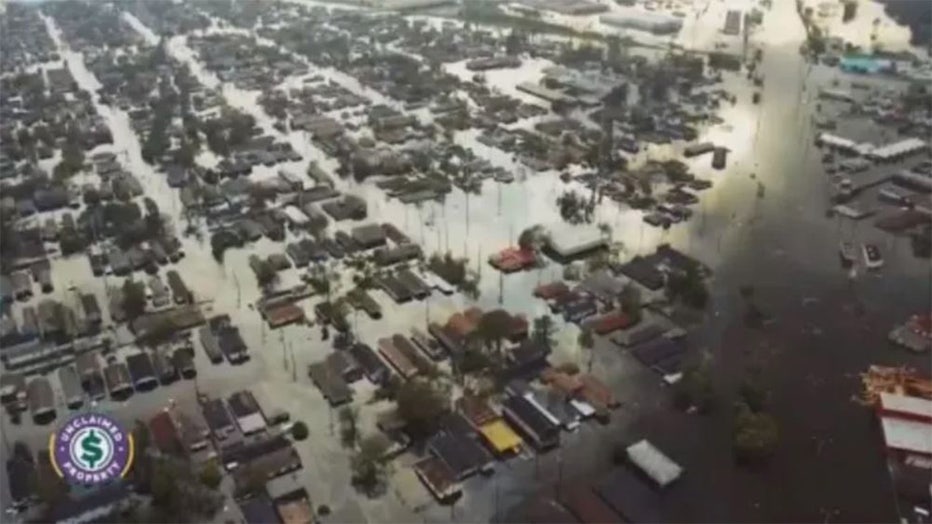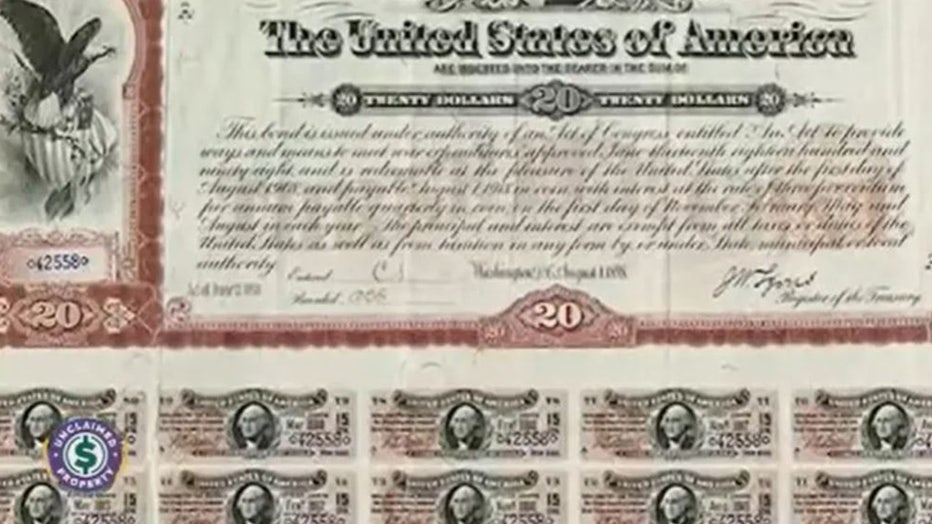Family paid $250,000 after cashing in bonds left tattered by Hurricane Katrina

Family cashes in $250,000 of bonds missing since Hurricane Katrina
The family of the deceased found the bond tatters and was able to cash them in for a quarter million dollars. (Credit: Louisiana Treasury via FOX Weather)
One family is a quarter-of-a-million-dollars richer after finding Hurricane Katrina "survivors" stuffed in an attic – bearer bonds.
They took the tattered documents to the Louisiana Treasurer’s office, where officials pieced them together 18 years later.
"You never know what could be unclaimed property," Louisiana Treasurer John Schroder said in a news release.

Hurricane Katrina's storm surge swamped New Orleans then levee and pump failures compounded the flooding. (Louisiana Treasury / FOX Weather)
PROPERTY SUSTAIN HURRICANE DAMAGE? HERE'S WHAT YOU SHOULD DO
"So a bearer bond is a bond like municipal bond or anything else that was issued before there were computers," he added. "In order for a person or an entity to get paid the interest on the bond that they purchased, there were these coupons attached to the bond certificate, and literally you would clip the coupon and the coupon had a date and an amount, and you would go to the bank with your coupon on the date that was specified, and they would pay you the amount specified. That's how you got paid your interest on bonds."
THE BEASTS OF THE ATLANTIC: 94 RETIRED HURRICANE OR TROPICAL STORM NAMES

Bearer bond purchasers must bring the actual coupons to the bank to cash in. (Louisiana Treasury / FOX Weather)
Before and after Hurricane Katrina
A Louisiana man bought bonds and stored them in a safe deposit box at the Whitney Bank in New Orleans. Hurricane Katrina ravaged the city in 2005, and the floods put the bank, all safety deposit boxes and bearer bonds underwater.
HERE ARE THE HURRICANE NAMES FOR THE 2023 ATLANTIC SEASON

The Whitney Bank sat on the main floor of this building in New Orleans. (Louisiana Treasury / FOX Weather)
Once the water subsided, the man collected his soggy bonds and put them in his attic and apparently forgot about them.
The man recently died, and his family found the bonds while cleaning out his house. They were in shreds after being underwater and then stored in attic heat.
"They had sort of, I think, given up on being able to collect on all of them, because when they went looking for the original paying agent and the paying agent no longer existed, and they were at a loss as to what to do and someone suggested they contact our office," John Broussard, the Louisiana Treasury Chief Investment Officer, said in the release.
Officials of the Unclaimed Property department researched the bonds and found that the paying agent had reported the coupons and interest unclaimed before going under. The state still had the money and told the family to bring in the rotten paper.
"This is a very rare case where we received all deteriorated paper bonds," Broussard said. "We scattered the torn and wrinkled bonds across the conference table. In the end, we were able to successfully match the physical bonds with our treasury records, and the significant claim was paid out to the heirs of those bonds."
Costliest U.S. hurricane ever
Hurricane Katrina was the costliest U.S. hurricane ever to make landfall. The Category 3 cyclone blew sustained winds of 125 mph, which helped push a storm surge upwards of 30 feet ashore, but breaches of levees around New Orleans caused devastating floods in the city.
TOP 5 COSTLIEST HURRICANES IN US HISTORY

Hurricane Katrina: Ferocious storm devastated New Orleans
Hurricane Katrina, the costliest hurricane in U.S. history, slammed into Louisiana on August 29, 2005. The winds and flooding that resulted from the storm caused nearly $187 billion in damage. (FOX Weather)
Surveys estimated damage topped $191.3 billion, based on 2023 Consumer Price Index values.
In addition to the loss of property, nearly 1,400 people were reported to have been killed by the storm.

